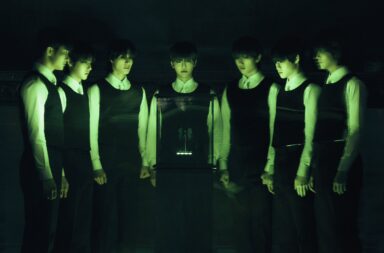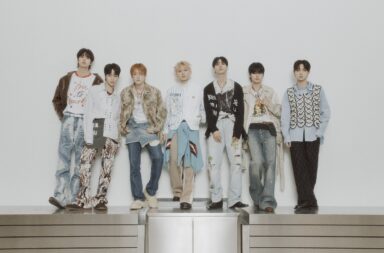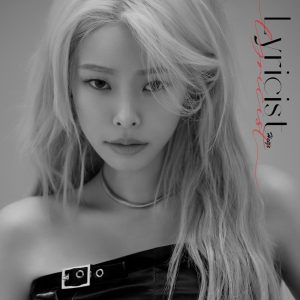
Versatility and growth: these are qualities we search for and praise in artists. However, there are a few music makers who stick to a distinct and largely unchanging style, but nevertheless continue to enthrall. Something about what they have to offer, no matter how predictable, continues to draw listeners in, to move them, and to leave them eager for more.
Heize is one such artist. She’s back with the mini album Lyricist–it is filled with graceful, often whimsical songs that pack a devastatingly melancholy punch. Which is to say, it is a very Heize-like Heize album. It is also tiny, even by mini album standards, containing five tracks that run just under fifteen minutes. However, the wistful spell Lyricist casts makes it seem much longer. The songs blend smoothly one into the next, creating a singular dreamlike musical experience. This effect is shared by several of Heize’s previous mini albums, particularly 2019’s Late Autumn. It feels fitting then that Lyricist, like Late Autumn and Heize’s full-length album She’s Fine, ends with a short instrumental track. “Not to see you again.” showcases an unexpected but elegant combination of piano and soft electric guitar. It is a lovely outro for Lyricist, gently bidding you to leave Heize’s realm and return to reality.
Since “Not to see you again.” is a bite-sized exit door, that means the core of Lyricist is composed of four songs. Half of these are title tracks as, not for the first time, Heize is promoting two songs off this album. She even released a wonderfully evocative MV that combines “Things are going well” and “Lyricist”, which shares its title with the album itself. Despite being presented together, these two songs are notably different from each other.
In “Things are going well”, a simple beat and unobtrusive production allow Heize’s lilting, emotive voice to take center stage. It is a strategy she frequently employs to highlight her golden tone. “Things are going well” resembles several of Heize’s more sonically bright tracks, such as “No Reason” and “Jenga”. Like those songs, “Things are going well” has a compelling tonal mix of resilience and bitter sadness. Unfortunately, it is not as strong an effort as the previously mentioned tracks, and thus comes off like a song that’s been done before, and done better.
In contrast, “Lyricist” is the most distinctive track on the album. Its production is understatedly brilliant, drawing on jazz and bossa nova influences. The subtle use of electric guitar is pleasantly unexpected, as is the intriguing spoken word insert that is slipped into the instrumentation. This combination of sonic choices gives “Lyricist” the quality of being simultaneously classic and contemporary, a characteristic of many of Heize’s best works.
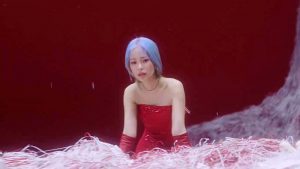
Fittingly, “Lyricist” is lyrically memorable. While the lyrics of the whole album are artfully done, most of the songs focus on familiar topics, like falling in or out of love. “Lyricist” sees Heize engage in an act of profound self-examination, providing a fascinating glance into the perspective of a songwriter. The track reads as a blunt confession, a sincere apology, and a merciless condemnation, all at once. At times, it seems like Heize is directing the whole thing at herself, the person who is the source and often the greatest victim of her songwriter’s calling, and its demand of radical honesty:
In my writing, I can’t protect you
Sometimes I think, it’s like I’m cursed
I don’t want to let you hear it
I have to write it down, I have to note it down,
Even if you don’t want it
Taken together, the inventive production and insightful lyrical content of “Lyricist” make it truly memorable. It is the song off this album with the most potential to become a signature Heize track, on par with but distinctive from her previous standouts.
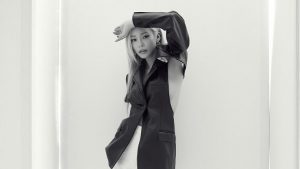
One of Heize’s trademarks is her frequent collaborations. It is therefore unsurprising that Lyricist includes two tracks with featured artists. Some of Heize’s most iconic songs have been collaborations, including “You, Clouds, Rain” featuring Shin Yong-jae and “We don’t talk together” featuring Giriboy and produced by BTS’ Suga. Sadly, while the collaborations on Lyricist are enjoyable, they don’t quite rise to that level.
“Your name” featuring Ash Island is sonically lusher than Lyricist’s other tracks. Its fuller sound is a pleasant divergence, as is its comparatively fast tempo. The simple chorus, with a plaintive repeat of the title as the only lyric, is surprisingly catchy. However, the feature itself has some issues. Ash Island’s heavily autotuned rap verse is jarring after the honey-tinged sorrow of Heize’s vocals. There is something interesting in the contrast between the two, but that is never fully explored, and the collaboration ultimately lacks coherence. Additionally, “Your name” drags in its back half, beginning to feel repetitious and slightly overlong.
Lyricist’s most unexpected track is “1/1440”. Featured artist Ji Chanel opens the song, immediately establishing a unique vibe. “1/1440” has a notably more synth-heavy production and light-hearted feel than the rest of the album. It also takes the autotune in “Your name” to the next level, applying it to even Heize’s vocals. It is an interesting choice, but unavoidably obscures her usually spectacular tone. The song is a summer jam which, while appropriate for the season, is quite discordant with Lyricist and Heize’s broader discography. “1/1440” is admirably experimental, but ultimately the most forgettable track on the album. More importantly, it feels like something another artist could have created.

The lackluster impact of “1/1440” may point to the reason why Heize generally sticks with her signature approach. She did evolve early in her career, moving from a groovier rap-focused sound to her current melancholic, vocal-heavy style. However, since then, Heize has been incredibly consistent. On closer examination, it seems that this is because she has found the emotions and topics which speak most to her, and the musical stylings through which she can best express herself. For some performers, versatility and experimentation are crucial to developing their skills. For others, like Heize, consistency is where they find their inspiration, and how they assert their unique perspective. Neither method is better than the other, so long as the artist is creating with boldness and authenticity.
Heize isn’t breaking new ground with Lyricist. Many of the things she does in the album she’s done in the past, sometimes more successfully. In spite of this, Lyricist is a remarkably engaging musical experience. Heize once more brings her delicate yet strikingly passionate artistry to the table, and it compels. Lyricist is far from Heize’s strongest release, but it is well worth a listen. That more than anything shows the power of Heize’s authentic voice.
(Korea JoongAng Daily, YouTube. Lyrics via YouTube. Images via Stone Music Entertainment.)

